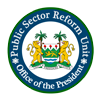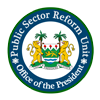The current Public Sector Reform Programme (2009-15) incorporates a Civil Service Reform framework. The PSRP is a collaborative effort, funded by GoSL and multiple Development Partners. The overall goal of the Programme is to improve public sector productivity and service delivery to all levels of society, consistent with the developmental priorities articulated in the Government’s Agenda for Prosperity (Pillar 7-Governance). The 8 Thematic interventions: The framework covers amongst others:
- Strategic and Structural Alignment
- Staff, Pay and Incentives
- Improvements in Systems and Tools
- Improvements in Service Delivery
- Capacity Building
- Gender and Anti Corruption
- Attitudinal and Behavioural Change
- Public Service Reform Co-ordination and Management
Why the need for a Public Sector Reform Framework?
- Lack of co-ordination in reform initiatives (both GoSL and Development Partners)
- Supply/Donor-driven reform initiatives due to a lack of overall reform Framework and GoSL ownership / leadership
- Low public sector productivity
- Lack of capacity in the public service
- Uncompetitive rewards, no effective performance management
Benefits
The Reform programme aims to realise the following benefits:
- GoSL Ownership and Leadership – Public sector reform that is owned, implemented and managed by the government in an holistic manner
- Effective Collaboration and Partnership – A focal point at which all Development Partners can respond with respect to the co-ordination, funding and management of Public Sector reforms. harmonised, standardised systems and processes in the public service
- a lean, highly trained, motivated, performance-oriented citizen-focused public service
- Transparency and accountibility – a transparent and accountable public service that delivers value for money and quality services on a timely and equitable basis
- Harmonisation, standardisation and a more systematic approach to addressing the problems across the public service
- Development and entrenchment of structures, systems and processes within the Civil and Public Service which respond to the vision and the aspirations of the people of Sierra Leone
THE REFORM PATH
The reform path is aimed at maximizing results by ensuring careful timing and logical sequencing of reform measures in a way that ensures efficiency and maximizes complementary impact. It is recognized, for instance, that for the Pay Reforms to be effective and sustainable, the next wave of pay adjustments must be preceded by both impact maximizing and cost saving measures. Therefore it is important that the next steps in the Pay Reforms follow a path that ensures an assessment of the labour market for public sector jobs is undertaken to form the basis of job evaluation and re-grading. This will form the foundation for an equitable, competitive pay regime.
Enhancing the integrity of the payroll through (a) a transparent and fair pay determination and administration regime, and (b) payroll and personnel records clean-up, will not only further ensure fairness and equity in Pay Administration and Management, but also increase fiscal predictability, and, together with reductions in obsolete posts and redundancies, enhance productivity and efficiency while guaranteeing affordability and sustainability of the payroll.
It is also important that the overall strategy for filling critical skills gaps be based on an evaluation of the labour market situation, be informed by the Management and Functional Reviews of the MDAs and the review of the establishment structures to reflect the functional requirements of a modern Public Service.
Furthermore, to motivate Performance for Results, and complement Pay Reforms, the Performance Management reform framework is anchored on multi-level appraisal systems, accountability mechanisms and rewards and sanctions. The Reform Path takes due cognizance of existing institutional weaknesses in the key reform implementing agencies, and therefore emphasizes institutional capacity building for the PSC, HRMO and the line MDAs to provide them with the necessary structural and logistical capacities and skills for Recruitment, Selection and Performance Management.
The Public Sector Reform Programme is anchored on the developmental priorities of Sierra Leone as articulated in the Agenda for Change (PRSP II), and is being accorded greater emphasis and higher priority in the forthcoming Agenda for Prosperity (PRSP III).



